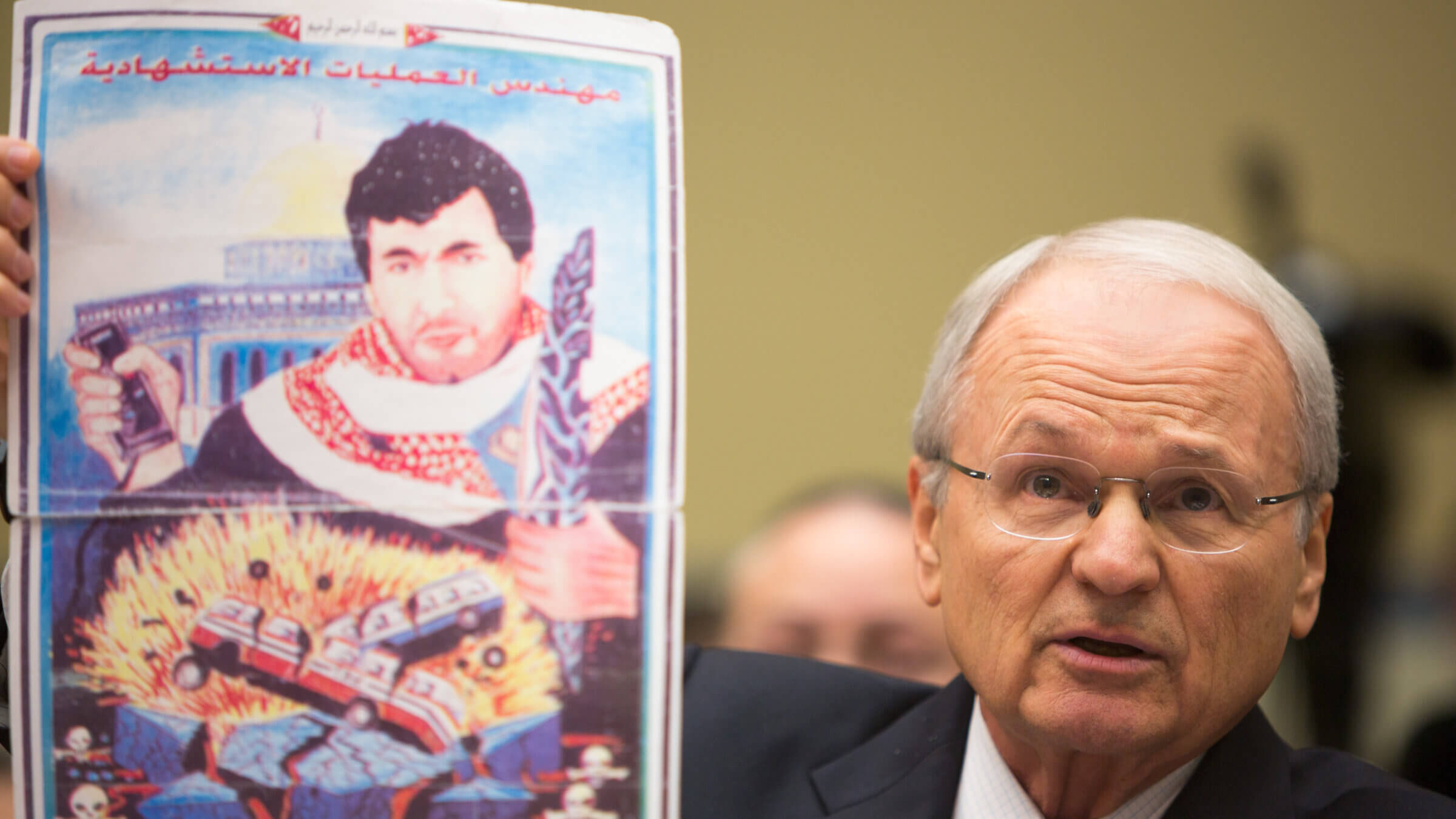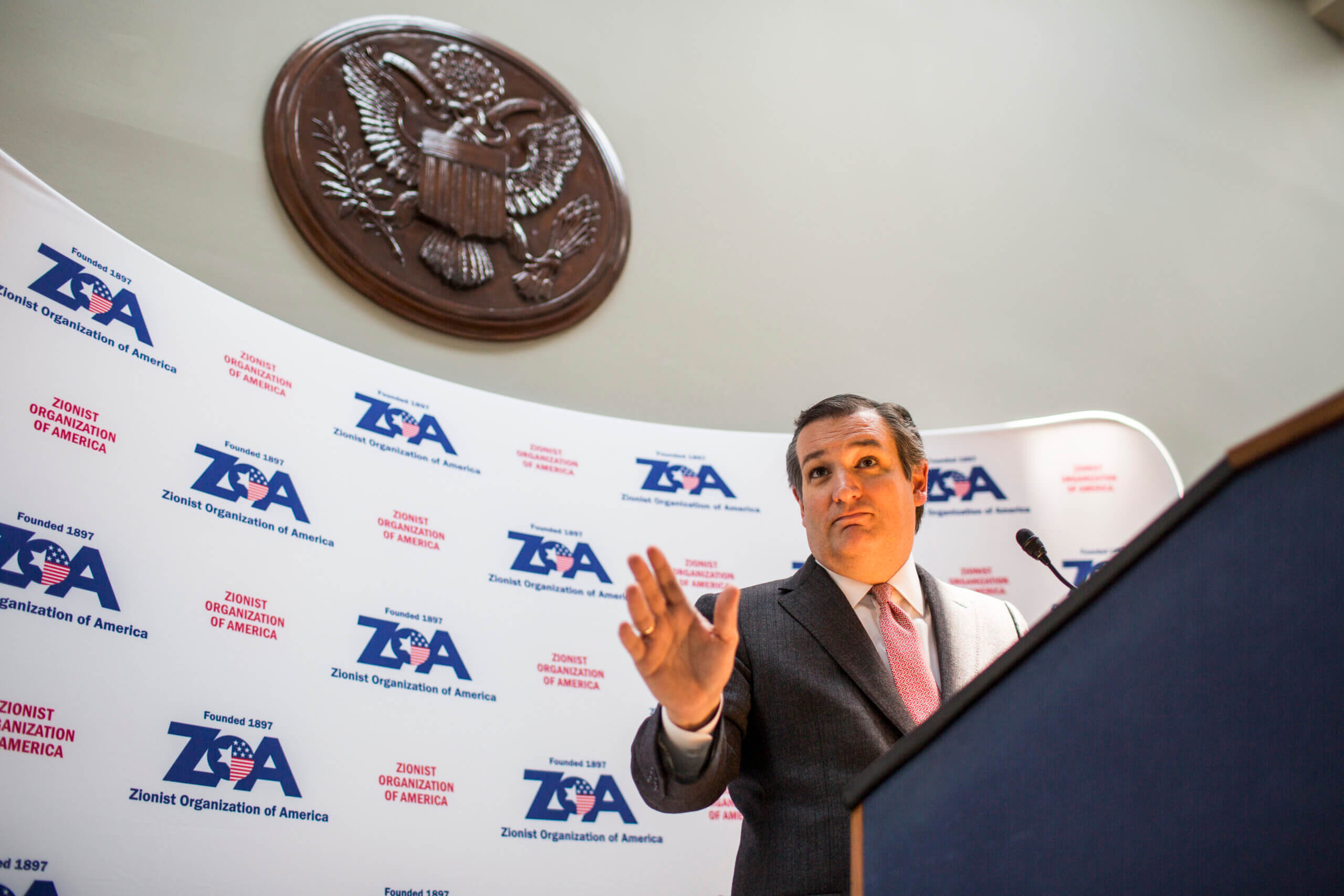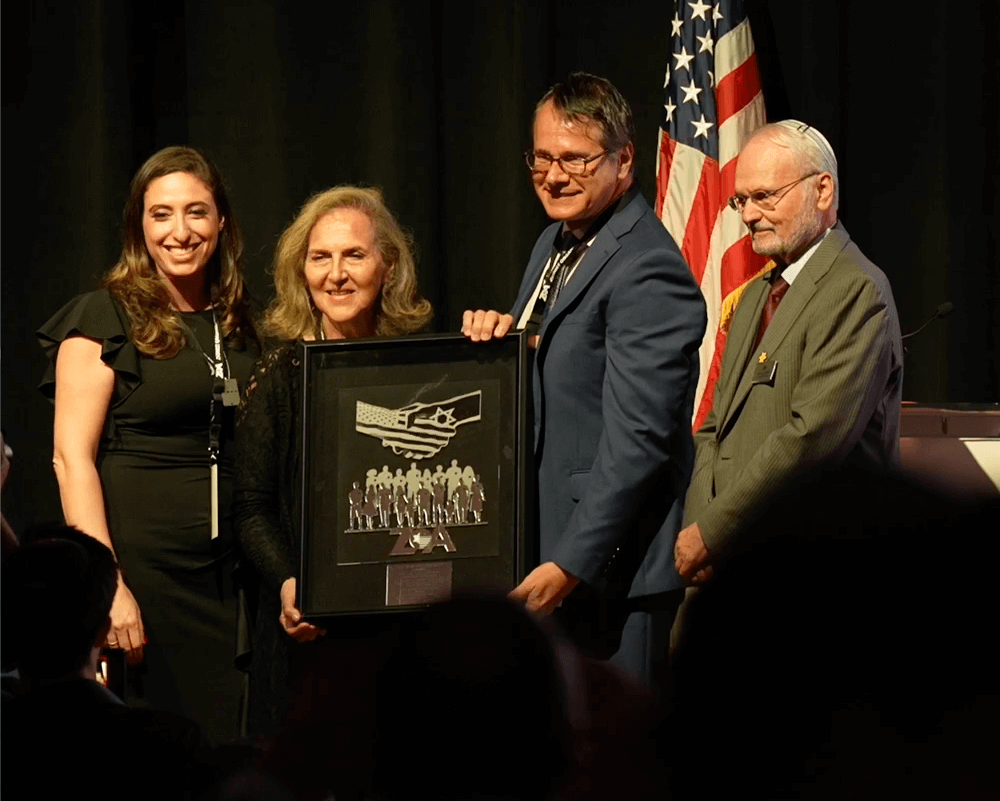Claims of ‘ego-driven jihad’ as feud escalates at Zionist Organization of America
Two board members are asking a court to remove Mort Klein as president of the pro-Israel group

Mort Klein, president of Zionist Organization of America, has weathered more than a decade of allegations that he has mismanaged the organization, which attorneys for Klein say are drive by disgruntled former employees and personal vendettas. Photo by Getty Images
After years of turmoil at the Zionist Organization of America, two board members are asking a judge to remove Mort Klein from his longtime perch atop the group, alleging financial misconduct and poor leadership.
The board members, Brian Grodman and Paul Tartell, claim in a lawsuit filed last week that Klein has “effectively clipped the wings of the ZOA for his own self-interest,” arguing that the group has been absent from the Jewish communal responses to the Hamas terror attack on Oct. 7.
Marc Kasowitz, who previously served as Donald Trump’s personal attorney, is defending Klein and accused the dissident board members of waging “a selfish and ego-driven jihad” in letters filed with the court.
Another attorney for ZOA, Fria Kermani, said in an email that Tartell was motivated by a personal vendetta against Klein after not being named board chair last year. Kermani promised a countersuit, a threat that the board members’ lawyer, Steven Goldberg, described as “the shriek of a frightened, cornered rat.”
It is the latest turn in a long-running saga in which a series of ZOA leaders have turned on Klein, whose pugnacious style has long alienated more moderate leaders across the Jewish establishment. Klein, ZOA’s chief since 1994, has consistently denied wrongdoing while weathering more than a decade of inflammatory allegations of financial impropriety, workplace harassment and racism.
ZOA, once one of the country’s largest pro-Israel forces, shrunk significantly over the past 20 years, with a brief resurgence during the Trump administration.
The latest suit could have deeper ramifications than prior ones by individual employees because it effectively asks the court to overthrow Klein. If successful, it could also force Klein to return millions of dollars to the organization that Grodman and Tartell claim he illegitimately received.
Goldberg, the attorney representing the board members, is himself a former vice-chair of the ZOA who accused Klein of financial mismanagement more than a decade ago.
According to the lawsuit, Tartell called a board meeting in July to discuss allegations of Klein’s wrongdoing. Eleven of the roughly 32 members attended, nine of whom voted to commission an independent investigation into Klein’s management. Meanwhile, the lawsuit says, ZOA’s executive director called a competing meeting in which 11 other board members voted to declare any action taken at Tartell’s meeting “illegitimate.”
The independent investigation stalled after Kasowitz told the firm hired to conduct it that they were not authorized to do it, according to court records.
The lawsuit marks an about face for Tartell, who lavished praise on Klein and posed for photos with him at a March dinner where he received an award from ZOA.
“Mort Klein has had the insight and fortitude to stand alone against deeply flawed conventional thought and groupthink only to be viciously attacked for merely pointing out the truth,” Tartell said that night. “As history has repeatedly shown, Mort and ZOA have been correct on every major issue.”
Finances questioned — and defended
The lawsuit accuses Klein of turning the ZOA into “at best, an irrelevancy, and, at worst, a joke” — and of using one of the organization’s credit cards “for his own personal gain.” It says the nonprofit group’s funds have been used to “support a lavish personal lifestyle that includes, for example, high end limousine services, business and first class travel, and luxury hotel stays.”
Kasowitz, the former Trump lawyer, called the allegations “frivolous” and said in a letter filed with the court that the plaintiffs’ complaints are really about a “philosophical disagreement” with Klein. In a series of indignant letters to the plaintiffs’ lawyers, Kasowitz accused them of the “jihad” and of trying to “take hostage the vital substantive work of the ZOA at a time of acute criticality for Jews and Israel.”
Kermani, the other Klein lawyer, said in an email to the Forward that “every action taken by Mr. Klein has been authorized and aligned with advancing the ZOA’s mission.” The plaintiffs have not provided any examples of credit card abuse, she added, “because no such misuse exists.”

ZOA’s annual budget is around $5 million, according to public records, but it has more than $40 million in assets, mostly from selling its Manhattan headquarters in 2016.
Sheldon Adelson, the billionaire casino magnate and philanthropist who died in 2021, was one of the organization’s main financial backers and his widow, Miriam, has remained a strong supporter.
The organization’s financial management has been questioned since at least 2012, when the ZOA temporarily lost its tax-exempt status. Goldberg said at the time he had not been shown a budget for the group for years and later ran unsuccessfully against Klein for president of the organization.
The ZOA paid Klein $573,000 in 2022, records show; the lawsuit states that he is now receiving $600,000. That would represent a nearly 450% increase since 2001; in 2008 his pay spiked to $1.2 million.
The lawsuit claims that Klein received pay raises that were not authorized by the board, and that he should not have received any salary during certain years, when he had other work as a paid consultant (the organization’s constitution, Goldberg said, only allows for the president to be paid if they do not have other income). The lawsuit says Klein owes the organization at least $5 million.
An ‘impotent and ineffective’ organization
In July, Tartell and Grodman called for the board to oust Klein, both because of these alleged financial issues and because of what they saw as generally poor leadership.
They pointed to the ZOA’s absence from the 10/7 Project, created to provide pro-Israel messaging about the war in Gaza. It includes the American Jewish Committee, Jewish Federations of North America, Anti-Defamation League, AIPAC and the Conference of Presidents of Major American Jewish Organizations, a coalition that censured Klein in 2019 for denigrating other Jewish groups.
The dissident board members also say that ZOA “has almost no college campus presence,” no office in Israel or in most major U.S. Jewish communities, and “has effectively been ostracized by every major Jewish organization,” all claims that the organization’s attorneys disputed.

And the lawsuit also states – though it does not provide details — that Klein used the organization’s money for his own benefit.
Asked for evidence of this, Goldberg said: “Some things have to be obtained by discovery through ZOA records.”
Tartell generally shares Klein’s hardline views on Israel as Klein. At the March event, he called for Israel to destroy Gaza and make it “uninhabitable for the foreseeable future” and said both its residents and Palestinians in the West Bank should be resettled elsewhere in the Middle East.
A Florida physician, Tartell has faced legal troubles of his own: In 2017, he paid $750,000 to settle allegations from the Department of Justice that he had falsely billed Medicare for procedures he did not perform. Goldberg said he did not admit wrongdoing and was cleared in a subsequent state investigation.
Kermani, the lawyer for Klein, said that settlement, combined with “dominating and antagonizing other board members at meetings,” were among the reasons Tartell was not selected as board chair last year.
Kasowitz also said that the ZOA board voted to remove Tartell after the dueling July meetings.
Past allegations of racism and mismanagement
Many of the allegations raised in the current lawsuit draw on those addressed in previous litigation. John Rosen, who was fired as ZOA’s executive director two years ago, sued Klein shortly afterward, claiming that he denigrated Black people and women, and bullied his staff.
(The suit was dismissed last year on a technicality; Rosen is appealing.)
David Schoen, the organization’s board chair at the time, said then that Rosen was actually fired after an outside investigation cleared Klein of wrongdoing. But Schoen himself stepped down as board chair several weeks later over disputes with Klein.
David Drimer, who served as director before Rosen, also sued ZOA, claiming Klein improperly inflated his own compensation; they settled the case.
Kermani denied that there is a pattern of ZOA leaders suing the group. “The ZOA has had only two lawsuits by top executives in the past 127 years,” Kermani said, “ and the plaintiffs in those lawsuits are disgruntled former employees who were terminated by ZOA and brought baseless litigation in response.”
But Tartell and Grodman’s lawsuit may be different. While they are the only two named plaintiffs, seven other board members joined them at the July meeting in voting to investigate Klein.
Sherly Silver, the organization’s secretary, took minutes of the meeting that were submitted to the court. Silver had also heaped praise on Klein during the March dinner, recalling her support for his underdog bid to become president of the organization in 1993.
After Klein won the election, she told the audience, a man who was supporting Klein’s opponent “wagged his finger in my face and said, ‘You know what you just did? That guy Klein is going to be the end of ZOA.”
Silver added: “I said, ‘Well I hope you’re wrong.’”
















